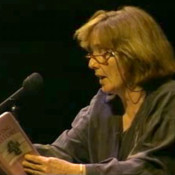
EVENT DETAILS: 6:00 pm, Friday, 25 April 2014. Center for Marxist Education, 550 Massachusetts Avenue, Cambridge, MA. Poet-critics David Hadbawnik and Daniel Remein lead “Radical Medievalism,” a seminar attending to concerns focused on medievalism as poetic and scholarly practice, the San Francisco Renaissance, and the agitated relation of Berkeley poets Jack Spicer and Robin Blaser to the English Department. Following talks and moderated discussion, Hadbawnik and Remein will read from their recent work in poetry and translation.
TALK DESCRIPTIONS:
DAVID HADBAWNIK | JACK SPICER AND THE ENGLISH DEPARTMENT: This talk will expand on ideas from my previous essay on Jack Spicer and Geoffrey Chaucer, “Time Mechanics,” to discuss Spicer’s troubled and tension-filled relationship with literary studies. Contemporary critics have often seen Spicer’s poetics of “dictation” as a radical break with literary tradition and academic learning, and a warrant for avant-garde strategies such as those of the Language writers. Spicer himself contributed to this perception with statements such as “I learned this from the English Department (and from the English Department of the spirit — that great quagmire that lurks at the bottom of all of us) and it ruined ten years of my poetry.” This attitude seems to have set the tone for a generation of poet-scholars who only reluctantly enter academia, viewing it as a means of pursuing a livelihood and an increasingly unlikely venue for political action. I will explore Spicer’s ambivalent but ultimately generative relationship to the English Department, and the ways in which it shaped him as a poet and political thinker.
DANIEL REMEIN | BEOWULF AND THE BERKELEY RENAISSANCE: In his first attempt to systematically formulate his poetics in print, the twentieth-century poet Robin Blaser (collaborator with Jack Spicer and Robert Duncan in the “Berkeley Renaissance” of the late 1940’s and early 50’s) links the basic questions of his poetics to an experience of listening to philologist Arthur Brodeur read aloud from Beowulf during a graduate seminar at UC Berkeley, that Blaser and Spicer took together (in 1949 or 1950). My talk closely reads Blaser’s anecdote in tandem with Spicer’s classroom notes in the context of the pedagogy of Old English at mid-century. I explore how Blaser and Spicer negotiate their responses to Beowulf and the aesthetically-oriented philology which characterized critical work on Beowulf at mid-century—even as the two avant-garde poets worked to distance themselves from the tendencies of the New Criticism and to contribute to the development of an institutional creative writing curriculum. In particular, I argue that a broad “English Studies” disciplinary model afforded Blaser and Spicer an institutional space in which to formulate their decidedly avant-garde poetics. In their responses to Brodeur’s classroom, Spicer and Blaser both work towards formulating an aesthetics consonant with their politics.
BIO NOTES:
DAVID HADBAWNIK is a poet living in Buffalo, NY. Part one of his translation of the Aeneid was published in 2013 (Little Red Leaves); part two is forthcoming in 2014. In 2012, he edited Thomas Meyer’s Beowulf (Punctum Books), and in 2011 he edited (with Sean Reynolds) selections from Jack Spicer’s Beowulf for CUNY’s Lost and Found Document Series. Other publications include Field Work (BlazeVOX, 2011),Translations From Creeley (Sardines, 2008), Ovid in Exile (Interbirth, 2007), and SF Spleen (Skanky Possum, 2006). He is the editor and publisher of Habenicht Press and the journal kadar koli, and a co-editor of eth press.
DANIEL REMEIN holds a Ph.D in English from New York University where he completed a dissertation on medieval poetics and the Berkeley Renaissance. He is the author of the chapbook Pearl and his poems appear in a number of journals, most recently in TAG and Kadar Koli, He’s also a founding collaborator with the Organism for Poetic Research and its journal PELT, a co-editor of Eth Press, and editor of the occasional journal Whiskey and Fox.
SEMINAR MATERIALS: We strongly encourage attendees to read through the materials linked to below in advance of the seminar:





